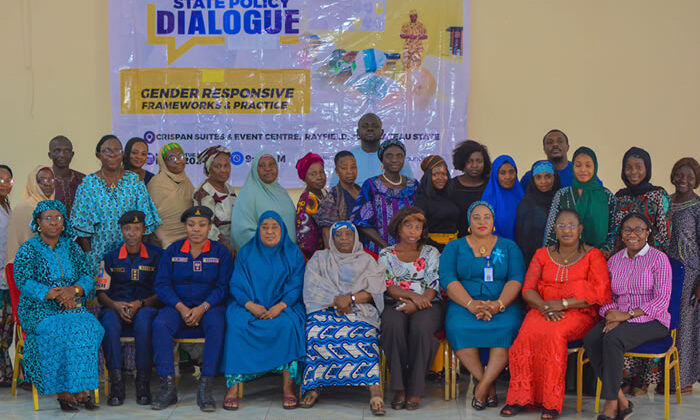The Nigerian National Adaptation Plan (NAP) [I, II & III] has a relatively strong focus on recruiting and retaining women in the security sector.
The first NAP pledges that, “Women should form at least 35% of the military and security force in the country.” However, significant numerical deficits exist in almost all the Security Sector Institutions (SSIs).
This was disclosed during a Two-Day Policy Dialogue on Gender-Responsive Policies and Frameworks recently held in Jos, Plateau State, organized by the CLEEN Foundation. The Dialogue aimed to inspire concrete steps towards building more gender-responsive frameworks and practices in respective work areas.
Our correspondent reports that, participants were equipped with a renewed sense of purpose and direction as stakeholders and, more importantly, as mediators.
Speaking earlier, the Executive Director of CLEEN Foundation Mr. Peter Gad, who was represented by Gabriel Akinremi, said the event brings together policymakers, advocates, experts, and stakeholders from various sectors to discuss and share best practices in advancing gender equality and women’s empowerment.
He said, “Gender-responsive policies are crucial for creating an inclusive society where everyone has equal opportunities and rights.
“By implementing frameworks that consider women and girls’ specific needs and experiences, we can work towards a more equitable and just society for all,” he stated.
According to him, the two days will help them to engage in insightful discussions, share valuable experiences, and chart a course towards more inclusive and equitable policy frameworks.
Mr Gad noted that, “The dialogue serves as a platform for collaboration, learning, and collective action as we work towards building a more gender-responsive society.
“As we embark on this journey together, we must recognize the critical importance of gender equality in fostering sustainable development, social cohesion, and economic prosperity.
“By ensuring that our policies, programs, and practices are sensitive to the diversed needs and realities of women and girls, we can unlock their full potential as agents of positive change,” he explained.
According to him, they will explore innovative approaches, best practices, and lessons learned from different states and regions throughout the dialogue.
“We will delve into topics ranging from legal reforms and institutional mechanisms to grassroots initiatives and community engagement strategies.
“We pray and hope that the dialogue will inspire us to take concrete steps towards building more gender-responsive frameworks and practices in our respective work areas.
“Improve the participation of women in the security sector and peace building requires deliberate efforts to provide an enabling environment for women representatives at the top to serve as mentors to more women and girls,” he stated.
Also, to ensure national security policies are both gender-sensitive and responsive, this was captured in a Paper titled: “Gender in Peace Support Operations.”
It also noted that, “Gender representation to security management is crucial to the overall objectives of any security measures or decisions to restore normalcy and, that, the management of internal security can no longer be understood in one dimensional term as protection from external enemies.
“Other non-traditional aspects of national security, the protection from internal enemies, ignorance and despair, especially as it concerns women in particular, must be entrenched.
“Nigeria has witnessed unprecedented increase in the involvement of the military in the management of crime and violence.
He emphasized that “We can work towards a more equitable and just society for all by implementing frameworks that consider women’s and girls’ specific needs and experiences.”
They also had a session where he explained the importance of cyber security and how to prevent the event of cyber crime as a mediator, while the session on State frameworks was quite interesting, as Olumayowa Olaniyi has made the participants understand their role as stakeholders in society.
Together, the house listed and went through some of the policies they had thought were not even in existence; they also developed a work plan, which included a visit to the Gender and Peace Commission in Plateau State and the Ministry of Women Affairs to advocate for gender inclusion in their frameworks.
The participants also shared valuable experiences, charting a course towards more inclusive and equitable policy frameworks, and the dialogue served as a platform for collaboration, learning, and collective action, as participants worked towards building a more gender-responsive society.
The women were drawn from the NPF, NSCDC, NUJ, WPS Network, JNI and CAN, and they were split into groups to discuss how to mainstream gender balance and sensitivity in the state, security framework and how the security strategy can be more people-centric.
“It is essential to recognize the critical importance of gender equality in fostering sustainable development, social cohesion, and economic prosperity.
“We can unlock their full potential as agents of positive change by ensuring that policies, programs, and practices are sensitive to women and girls’ diverse needs and realities,” they stated.







